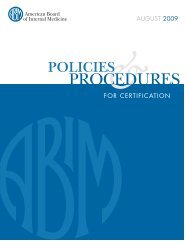The SRA Symposium - College of Medicine
The SRA Symposium - College of Medicine
The SRA Symposium - College of Medicine
You also want an ePaper? Increase the reach of your titles
YUMPU automatically turns print PDFs into web optimized ePapers that Google loves.
Papers<br />
Institutional Audit Findings:<br />
Potential non-compliance issues that are discovered during either the IRB review <strong>of</strong> research,<br />
previous internal auditing activities conducted by the Center for Clinical Research or by self-disclosure<br />
<strong>of</strong> the Principal Investigator or research staff, are investigated by the Compliance Officer,<br />
Clinical Research Manager, and Compliance Specialist <strong>of</strong> the Center for Clinical Research. A thorough<br />
investigation <strong>of</strong> the non-compliance allegation is conducted and a detailed summary with<br />
supporting documentation is presented to a full IRB committee. <strong>The</strong> non-compliance allegation is<br />
discussed and deliberated upon and the IRB votes on whether the non-compliance allegation is a<br />
case <strong>of</strong> non-serious non-compliance, serious non-compliance, or not an issue <strong>of</strong> non-compliance.<br />
From January 2002 through March 2005, the UHC IRB reviewed 35 non-compliance allegations<br />
(see Table 3). As demonstrated by the data, the majority (74.3%) <strong>of</strong> the non-compliance allegations<br />
were determined to be non-serious non-compliance. Table 3 also illustrates the overall low<br />
frequency <strong>of</strong> non-compliance issues that arose for determination by the UHC IRB as compared to<br />
the total number <strong>of</strong> actions the UHC IRB took during the respective time period.<br />
Of the 26 non-serious non-compliance determinations, the majority (80.8%) <strong>of</strong> non-serious<br />
non-compliance findings noted during this time period were attributable to the erroneous use <strong>of</strong><br />
expired, unapproved and/or unstamped consent forms. In terms <strong>of</strong> the 5 serious non-compliance<br />
findings, the trends noted ranged from the failure to obtain informed consent to the failure to<br />
report adverse events to the IRB. It should be noted the trends demonstrated in the non-compliance<br />
determinations are consistent with the audit findings <strong>of</strong> other institutions as presented by the<br />
Department <strong>of</strong> Health and Human Services Office <strong>of</strong> Human Research Protections.<br />
Conclusions:<br />
<strong>The</strong> information outlined in this paper reinforces the basic construct that research compliance<br />
monitoring must span the “entire life <strong>of</strong> a protocol” (i.e., from the time <strong>of</strong> receipt in a research<br />
administration <strong>of</strong>fice and even after completion <strong>of</strong> the study). In order for this level <strong>of</strong> complete<br />
monitoring to occur the review mechanisms must include all areas <strong>of</strong> research administration and<br />
not merely IRB review.<br />
Historically, the UHC Center for Clinical Research conducted internal auditing <strong>of</strong> research activities,<br />
but found that when non-compliance allegations arose, the investigations involved were<br />
extremely resource-intensive. <strong>The</strong>refore, integral to the development <strong>of</strong> the Research Compliance<br />
program at UHC was recognizing that dedicated personnel with particular expertise was needed<br />
to staff the program as opposed to further increasing the burdensome work load <strong>of</strong> IRB coordinators<br />
and specialists. Research compliance <strong>of</strong>fices are now becoming a standard component in most<br />
research institutions and there is momentum toward independent internal review by compliance<br />
specialists who are versed in regulatory compliance for all areas <strong>of</strong> research administration (Icenogle,<br />
2003).<br />
Of additional importance is to conduct these centralized research compliance monitoring activities<br />
in a prospective fashion for active studies in order to confirm congruence with required study<br />
monitoring plans, Federal regulations, and good clinical practice (GCP) guidelines (Sherwin &<br />
Fromell, 2002). Comprehensive monitoring programs are readily integrated with the operations <strong>of</strong><br />
IRBs, grant <strong>of</strong>fices and data and safety monitoring boards in ensuring the responsible conduct <strong>of</strong><br />
research across a broad continuum.<br />
72 2005 <strong>Symposium</strong> Proceedings Book

















